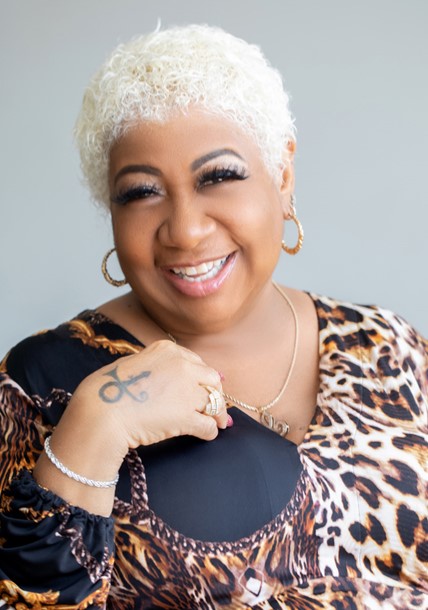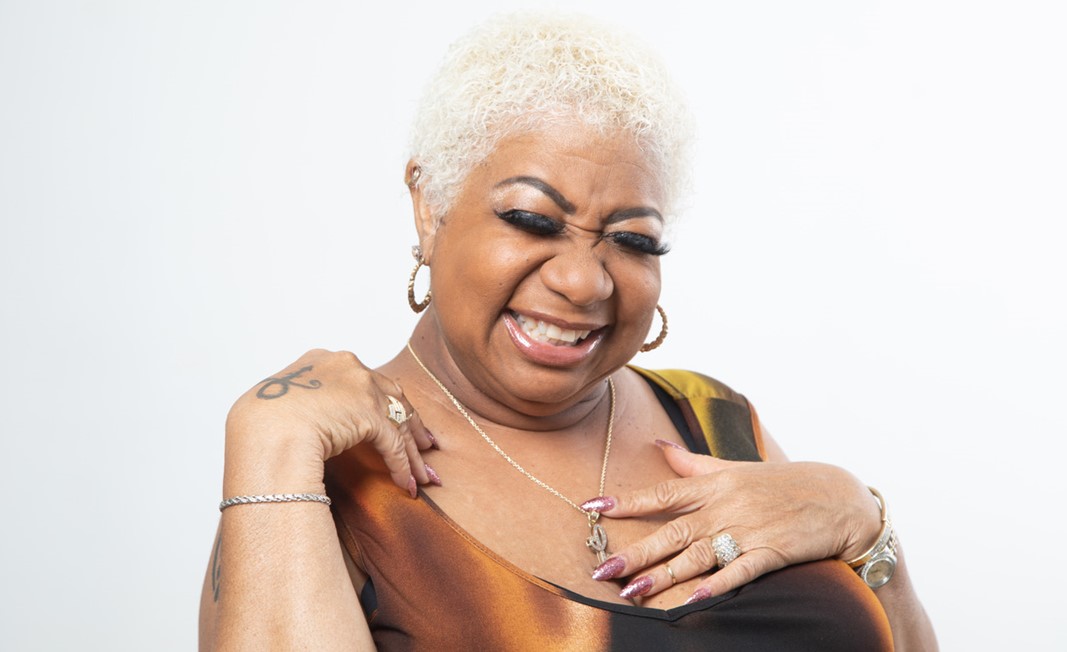Photo Credit: L-Murder Inc.
Comediennes are a special group, and women that make us laugh out loud – even when we’re alone – have a special talent. They bring it home for you in a way that you recognize and love, reminders of women we know and just gotta love for being so real and authentic.” Luenell is that “gotta love her” type of talent.
From the moment you see her and hear her, you know you haven’t been anywhere she hasn’t and you haven’t tried anything she hasn’t already. She takes you to that uproariously familiar spot that puts you in the mind of your most colorful relatives at a family get together.
Currently starring in the summer hit Block Party, Luenelle delivers a priceless performance as the neighborhood hairstylist, community confidante and social advisor on everything from your hair to your people.

In a recent interview following the release of the Juneteenth-centered film, Luenelle shared funny and fascinating insights about the film, her career, and the social cues she looks out for. The consummate comedian confesses she doesn’t quite remember how the role and her involvement in the film came about but says it was an experience she’ll never regret.
“It was during corona and you know a lot of our minds went kind of foggy at the time. I don’t remember if I auditioned or if they just made me an offer. But of course the opportunity to work with Margaret Avery and Golden Brooks, it became a very loving set and we have long-lasting friendships and relationships that came from that,” confides Luenelle. “And then the opportunity to work in Grand Rapids, Michigan and make it more like Atlanta in taking advantage of tax breaks for making the movie there was also very valuable and made the project even more attractive.”
Luenell adds that Block Party is based on real live people in actual locations in the Michigan community. “These are real places. There is an actual House of Styles in Grand Rapids and that’s where we filmed. The person I play is Deborah who owns the shop and then there is a vodka in Grand Rapids called Stock the Bar vodka,” she says laughingly in reference to her many drinking scenes in the movie. “I just hope the people of Grand Rapids take [the movie] as the love letter it was meant to be.”
But the veteran comic in a more poignant moment admits that it hasn’t been all laughs for her – professionally or personally. “When I was young, I was a very sad person. I have seven brothers and sisters, but I was raised alone due to a series of things that happened in the family,” adding that she also developed her sense of humor because of the family hardships and her less than optimal family background.
While the movie deals with a number of social issues Black families and communities are addressing in the real world including family relationships, education, elderly care, and gentrification, it provides a platform for examining the cultural landscape for Blacks in America.
On the lay of the land for Black comedians in Hollywood …
Being a Black female in anything is a challenge. … People are used to men leaving to go to work or go to war, but when mama leaves [home] to pursue a dream there can be a lot of ridicule. … And unless you have an understanding and supportive mate it can cause friction. Men can get forgiven quicker than a woman for infidelity on the road because they are super territorial … but it gets lonely out there and things do happen.
On her own journey to personal and professional success …
Luckily for me I do have a responsible Baby Daddy … and I was able to leave my daughter in her father’s care while I moved to Los Angeles to pursue my career. Being that my daughter’s father was a comic I knew the route and he said “don’t go down to LA b***s**** and I’ll pick up the slack, take care of the baby and do whatever needs to be done.” And I’m glad to say that is what indeed did happen.
On her career before the stage …
I did film and television long before I moved to Los Angeles. I used to stay in Oakland, California and my first was also Mike Meyers first film, I Married and Ax Murderer, and then my second film was The Rock with Sean Connery and Nicholas Cage. I was also a television veejay and talk show host on the Soul Beat Television network which was all Black-owned and operated. I did all that before moving to Los Angeles, … but there is no competition working in front of a live audience is my preference.
On her universal appeal and connectivity to audiences …
You probably have to ask someone other than me, but I think a lot of it goes back to my education. I have a Bachelor of Arts degree in English. I am very well spoken and I was raised around White folks in my formative years, so I am not scared of White people. I can have conversations with D-boys from the block as well as someone running for political office. I keep my feet well planted on the ground because I don’t like fake people and I think people that aren’t fake connect with that. You have to be funny to everyone, not just Black people, you have to be funny to Latino people, gay people, LGBTQ people, etc. I just try to be relatable to everybody.
On what she might have done differently …
In retrospect I don’t think there is much I would have done differently … I think that every good or bad step that I have taken has led me to where I am now. I know that I can sleep at night, I know that I feel safe and I am not here maliciously [harming] anyone. … I know that I have love in these streets because I am still very much in them. I know that I represent for my family, I represent for my people, my community and women … that’s what I try to do. Whether that’s good or bad, it’s my character.



